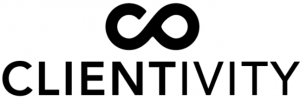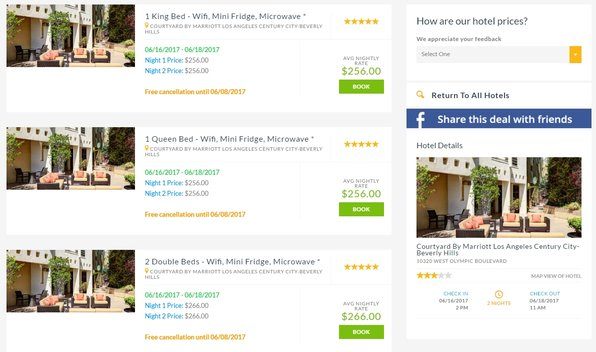
The travel industry has many key players that offer a lot of money making opportunities and one of the attractive high ticket items in this niche is hotel booking services. In today’s Clientivity review, I’ll show what is behind this program and why I think it’s NOT the best solution to start a travel business online.
What Is Clientivity?
Clientivity is a program that teams up with a number of hotel suppliers and lets you market them in the form of a booking website.
When someone makes a search, it would send a list of hotels to the user’s email, attached with a tracking link back to your site. When a successful hotel reservation is made, you get to keep a small percentage of the sales. That’s pretty much how an affiliate marketing business model works.
The entire setup takes only about 2 minutes, from signing up to verifying your user email. The user dashboard will look something like below and there’s really nothing much to do after that besides choosing a website theme for desktop and mobile.
How Much Can You Earn?
There are generally two ways to monetize from this program.
- 5% sales from direct customers, which means, for every $100 spent on the reservation, you would make $5.
- When someone partners through your link and create their own Clientivity website, you earn $20 for every $100 sales that they generate.
I went ahead and toyed around the platform for a bit and found it to be very different from many website solutions that I’ve reviewed in the past. But let’s talk about the good things first.
The Pros
1) For starters, it’s free and easy to set up. There is no membership or subscription fee to commit to for as long as the site sits on a subdomain property. If you are looking to get a custom domain name with privacy protection from GoDaddy (as recommended by the program), it would cost about $20/year.
2) There are many hotel selections and discounted rates to choose from all over the world.
3) These fancy looking pre-designed flyers are helpful for promoting on social networks like Facebook and Instagram.

4) Simple text/video tutorials are available to teach you how to get more customers and business partners. They even provide phone training at this age of the internet! Not bad.
5) The program automatically captures potential customer’s email and store them at the back end when someone make an inquiry about a hotel booking. These contact details could help build a list for your email marketing later on.
And that’s where all the good things end. Having run an affiliate business myself for the past 3 years, I couldn’t help noticing the defects that comes with this platform and feel the importance of sharing them before you get your hopes high about earning from such a program.
The Cons
1) As far as SEO is concerned, there’s only the meta title and meta description for the homepage (the meta keywords doesn’t count because it’s no longer an important ranking metric).
The biggest let down is that there’s no way to add pages/posts to the site. There is a segment to publish a short paragraph, but that’s about the only content that you can put up there.
Basically, this type of site lacks information and only contain a bunch of links pointing out to reservation pages. In case you are unaware, ‘thin sites’ like this are similar to many products-only eCommerce sites that have suffered in ranking since Google’s latest update. Since Google has hard time ‘reading’ what the site is all about, they have very slim chance to appear on the first page of the search result.
2) Secondly, without a blogging platform, how can you ever attract new visitors to your site? If there’s a blog, you can use targeted keywords, write some interesting topics and build your online readership.
3) Seeing that the SEO features are faulty, you are left with marketing through social media, which isn’t a bad idea considering the popularity of this niche. However, there’s a caveat.
A general population of the social audience is just curious browser who might click on the ‘30% sales banner’, but doesn’t have any interest in buying anything.
In order to convert people who are really interested, you’ll need Facebook Ads, which means using money to test what works and what doesn’t. If you are a total beginner to paid advertisement, this process can be a steep learning curve.
4) Another method that the training advocate is mobile texting. Seriously, I found this technique to be very old-fashioned and might not yield a lot of conversions as hoped.
5) While the lack of information on the site is a concern, the absence of solid reviews could cause you to lose potential customers. The only ‘description’ available is the (same) hotel image, some star ratings and the discounted room rates.
Is this enough to help people make a decision? I surely don’t think so because EVEN I would want to know more about a certain place before paying for an online booking.
 6) Remember the automatic email capturing feature mentioned earlier? Well, the bad news is, you are only limited to 100 contacts. You could add more, but not without the help of (paid) autoresponders and a bit of manual work tidying up the list.
6) Remember the automatic email capturing feature mentioned earlier? Well, the bad news is, you are only limited to 100 contacts. You could add more, but not without the help of (paid) autoresponders and a bit of manual work tidying up the list.
7) Lastly (although this isn’t really an issue with the program itself), I noticed a few broken links and spelling mistakes in the back end system. It makes me wonder if this platform is properly maintained, reliable or worse, legit.
What if you get someone to buy something that doesn’t exist yet you earn from it? Then, you would be committing a very serious online scam.
So, Is Clientivity Worthy of Your Time?
It’s quite a smart idea to gather a few hotels to create a booking site, but as you can see from the disadvantages, you’ll not go very far in the travel industry with this type of program. Acquiring online traffic would be your biggest challenge and so will getting people to convert on a platform that doesn’t really offer much.
At the end of the day, it’s better off to create a travel blog, leverage keywords to your advantage and be affiliated with reputable sites like Expedia and Booking if you want to generate extra income from hotel listings.
With content, you’ll be seen as more resourceful instead of just push-selling and that’s how you gain trust with the online audience.
Well, I sure hope that this Clientivity review has shown what you can and can’t get out of this program. If you like to know how to run a successful travel online business using the right kind of platform, please visit the Wealthy Affiliate training for more information.
Have any thoughts or questions about this article? Just leave them in the comment below and I’ll get back to you.
You may also be interested in;
Profitable Photography Affiliate Program for Your Niche

Hi Cathy,
Thanks for putting into perspective how a site like the one you build with Clientivity or eCommerce store on Shopify can make it difficult to rank in the search engines.
This means that you must rely heavily on paid traffic to make some sales correct?
Like you said, it’s a pretty interesting niche, but way too many flaws. However do you think that this can be applied to an established travel blog?
Thanks for sharing,
Diana
Yes Diana, without optimizing for organic search, you’ll need to invest (heavily) on paid advertising to get sales. I find Clientivity to be shoddy, so no, I wouldn’t recommend using this program for an established travel blog. Use Expedia or Booking.com instead. These companies are more trustworthy and people can relate to the brands better.
Hello there,
I just read your review of the Clientivity program, and I am quite impressed with how well you covered it.
I have been interested in affiliate marketing for some time, but 5% commission seems like a hard way to earn a living.
I checked out your link to Wealthy Affiliate and I was wondering just how good the training could be if it is free? Also, do they teach you where to go to earn a better percentage than 5%?
Hi Brendon, let me answer your questions one by one.
1/ 5% is actually not a bad figure. I would rather earn a 5% from $100 than a 5% from $50. If you can find a product that has a higher price range and popular at the same time, that 5% is worth marketing for.
2/ The free training in Wealthy Affiliate is basically for beginners – people who have no experience in online marketing and/or building a WordPress website. The free training will walk you through these fundamental topics and they are appropriate for affiliate marketers as well as local business owners;
– Understanding how to make money online
– Learn to choose a niche
– Build your own WordPress website (here’s where you get to use the free sites provided)
– Setting up the website and getting it ready for SEO
– Finding content ideas from keywords
– Creating good quality content
3/ If you are looking for a better commission than 5%, then you might be interested in promoting digital products such as eBooks, programs, software or membership subscription. Due to their low cost maintenance, vendors usually offer between 20% to 50% (or more) to affiliates. If you can find something like this within your niche (and that it’s also legitimate), by all means, go for it.
Hope this helps.
Thanks again for your awesome article and content. It’s like going back to school with you – I just keep learning these new things. It’s funny because I’ve been doing online marketing for a year and am quite comfortable, but I realize that I still know nothing about the field with all the different ways.
What awesome information! I never would have thought about this realm of travel booking before I read this. I definitely appreciate seeing all of the pros and cons laid out. As a person who is thinking about starting a travel blog, this information is really good to know.
Hi Meghan, the travel niche is a huge (and profitable) one and it’s wise to explore all the options available out there. Some may or may not work so remember to do your own research before implementing them on your blog.
This platform does seem pretty weak.
The most important thing to me would be whether or not my readers were getting good, reputable deals for traveling. In starting my online blog, my number one reason was to help others. Because of this, all the products and services I recommend must be of the best quality and price I can find. This to me is vital in gaining an audience’s trust.
You are absolutely right Helen. One shouldn’t be recommending unreliable products/services through affiliate marketing. It hurts your blog and most importantly, the whole industry. So many scams mask themselves as affiliate programs and that makes many people see it as an untrustworthy ‘business opportunity’.
Moving forward, new bloggers need to think more about giving their audience a good buyers experience rather than just making money out of them.